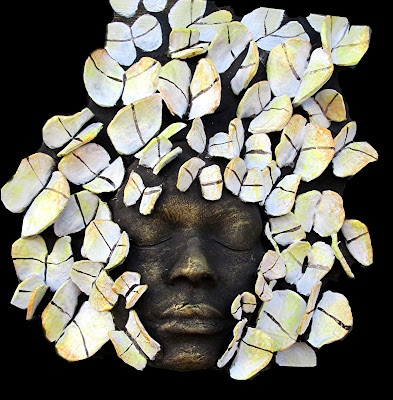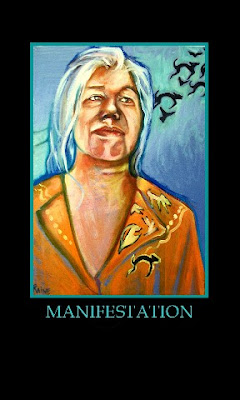"Hard times are coming, when we'll be wanting the voices of writers who can see alternatives to how we live now, can see through our fear-stricken society and its obsessive technologies to other ways of being, and even imagine real grounds for hope. We'll need writers who can remember freedom - poets, visionaries, - realists of a larger reality."
Ursula Leguin, from Acceptance Speech of National Book Foundation Award
Recently I attended a poetry reading at the Poetry Center at the University of Arizona by an acclaimed poet - I love poetry, the "Bards of our time", and am very pleased that the Poetry Center is in existence. She received an impressive audience, and an impressive introduction. But I walked away from this reading disappointed, even a bit angry. And yes, as I sat to contemplate my response, out popped two of my favorite quotes from my favorite wise woman of letters Ursula Kroeber Leguin, whose worlds and words I have inhabited for many long years.
Without introduction last night's poet did a long, very long, free form verse. I felt like I sat through an hour long tantrum, perfected over a 40 year career, but ultimately elegant in its obscurity and meaninglessness. Perhaps that was the rather nihilistic point itself, I don't know. Here and there a few good lines/images emerged from the rant, but to me nothing hung together enough to embed them into my mind and heart, nothing ever wove into some kind of basket of meaning, whether dark or light. Was I "disturbed" by this stream of "raw, disturbing, honest, evocative"..... whatever? No, I was bored.
The audience, after she finished, looked rather blank as they clapped. I found myself wondering, how many felt moved by (what I experienced as a tirade) or how many, like me, were secretly happy it was finally over. I wondered how many sat there nodding while inwardly feeling confused, a bit depressed.
And I thought of the times I've been at poetry events that brought tears to the eyes of those present, of how poets like Drew Dellinger, or Mary Oliver, Alice Walker, or many far more obscure and local as well...........can bring us into a far greater sphere of meaning, of connection, of empathy, of awe, of grief, of magic, even, heaven help us, that of Hope and Beauty.
These are among the "realists of a larger reality" we so ardently need now. In this time of the calcification of soul to capitalism, the loss of species and habitat, this time "before the flood".......we do not need artforms that teaches nihilism, despair, or ennui. We need visionaries, we need pathfinders who can help us see and connect the links, who can help us to weave the "medicine baskets" of new stories. There, I said it, a highly subjective, politically incorrect, comment.
We live in a time when the arts continue to be eliminated from primary education, when students are pressed into the universities (and lifelong debt) desperate for educations that will "get them a job" instead of the fortunate liberal educations my generation enjoyed, when the art districts are disappearing to be replaced with trendy restaurants and no one seems to notice, when actual conversation with people and the actual immediate and physical environment around them cannot possibly compete with the instant and consuming escape of cyberspace........those moments before a painting, those quotes that linger from a poem for a lifetime, may be fading into obsolescence.
All the more need for translators of the imaginal language. Poetry, art, are often a language that many need to be taught in order to ignite an appreciation, and I sense that more and more people are not learning to speak that language. Sometimes I feel that few people have even noticed that it is disappearing from the common vocabulary, consigned to obscure enclaves like the Poetry Center. As an AIRBNB host, I have had many people come into my home, which is also a gallery, over the years, and it's been disillusioning to see how very few of them notice the art; certainly they do not engage me in conversation about it. I've often joked to friends that I could just as easily hang mops on the walls for all that most people would notice (Tom Wolfe, author of The Painted Word, might reply that such an exhibit would be more "conceptually significant"..........)
Well, I wander off somewhere here. Masks aren't for everyone. But I do believe the for most people, without a meaningful education in the arts it is hard to have an appreciation or even curiosity about what is "spoken in a language one doesn't know how to speak" . And so the conversation is left one sided, or unanswered. And very lonely sometimes. But..........this does not let artists, the poets, the visionaries and shamans and myth makers of our time.......off the hook.
You are needed, you have work to do. Even if it seems like no one is noticing. Even if you don't get paid in dollars. You have heard the Call, and for better or worse in your personal or financial life, responded.
Last, I have to reflect that the ubiquitous celebration of the dark, the "shocking", the naively cynical, has become predictably "de regueur" in our jaded, de-sensitized world. In the halls of the High Art world, the word "beauty" is almost an obsolete anachronism, something we think of as too fluffy to be serious art. But if not Beauty, what? Beauty is not just a saccharine flower painting in a dollar store, beauty is the vitality, poignancy, and power of the lifeforce endlessly creating itself, in the world, in our own lives.
If I were to create a Manifesto that anyone would ever listen to, I would say as Leguin said: "Become a Realist of a Larger Reality".
“The trouble is that we have a bad habit, encouraged by pedants and sophisticates, of considering happiness as something rather stupid. Only pain is intellectual, only evil interesting.
This is the treason of the artist; a refusal to admit the banality of evil and the terrible boredom of pain.”
― Ursula K. Le Guin,
The Ones Who Walk Away from Omelas
































